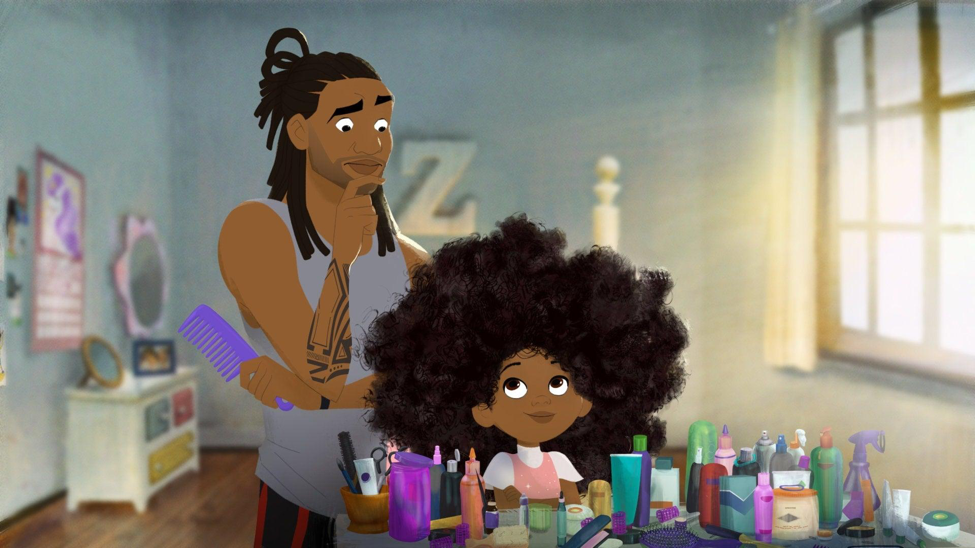Music and Movie Reviews | February 17th, 2020
“Hair Love” Shows Positive Representation of Black Hair And Black Fatherhood
By: Gabrielle Hall

The context of black hair has been a topic of discussion for decades. There have been many negative stereotypes formed about natural black hair, but until “Hair Love” there was little positive representation of natural hair in film, particularly in animation.
“Hair Love” is an animated short film directed by Matthew A. Cherry and Bruce W. Smith and co-produced by Cherry and Karen Rupert Toliver. The film is a mere seven minutes long, but it pulls on the strings of the heart in an instant.
Opening the film, Zuri, a young black girl with her bouncy natural curls browses through YouTube videos on how to style natural hair. The animation goes on to feature her dad Stephen who learns to style his daughter’s hair for the first time which is a task that is normally perceived as a maternal role.
This film becomes even more significant as it comes at a time when schools are cracking down on the expression of black hair.
Recently, DeAndre Arnolds, a black teenager from Texas, was banned from attending his high school graduation for refusing to cut off his locs. In another instance, Alan Maloney, a referee, forced Andrew Johnson, a high school wrestling competitor, to cut off his locs to participate in a wrestling match. To make matters worse, Johnson’s coach cut his dreadlocks off for him before the match in front of other attendees.
These actions are an extension of the negative stereotypes on locs being “dreadful” or unkempt and unprofessional for the workplace. Although, there have been motions put in place to end discrimination of black hair in the workplace.
Erika Johnson, a Voice Performance major, said she believes this animation could become a staple film for the black hair community.
“This is a groundbreaking moment,” Johnson said. “Due to the number of things that are in effect like the CROWN Act…I feel like it’s a momentous moment for our community to be viewed on that level.”
The CROWN Act was a bill sponsored and drafted by California Senator Holly Mitchell. Officially signed into law on July 3, 2019, it was the first legislation passed at the state level to prohibit discrimination based on a person’s hairstyle or texture.
Cherry’s inspiration came from an abundance of viral videos of black fathers with their kids. His decision to feature a black father attempting to do his daughter’s hair is a unique approach to displaying the difference in gender norms.
There is an inaccurate perception of black fatherhood that involves black fathers being absent and unproductive in their children’s lives. Contrasting this stereotype, according to research done by the Center for Disease Control and Prevention, the majority of black men live at home with their children. “Hair Love” shows an active father taking on a role that is different from what fathers are seen to do.
Bruce Carter, a father of four little girls, said he enjoyed seeing something positive and relatable to how his life is currently raising the girls on his own.
“It seems like a daunting task at first,” Carter said. “But as black fathers we stick with it, try to get better at it, so we can make sure our women look nice because women take pride in their hair, and it starts at a young age when they’re little girls.”
Carter himself has locs like the father in the video, which makes the short film more personal. He said he takes pride in his locs, which are a part of his identity as a black man.
Since its release, “Hair Love” has grabbed national attention, even winning an Oscar for Best Animated Short Film. In his acceptance speech, Cherry said he wanted to see a more positive representation of black people in animation.
““Hair Love” was born out of wanting to see more representation in animation but also wanting to normalize black hair,” Cherry said. “We have a real chance here to help make hair discrimination illegal through the Crown Act and get it passed as law for all 50 states.”
After California passed the CROWN Act, other states have begun to draft their own legislation of the CROWN Act. Randolph Bracy, a Democratic member of the Florida Senate, proposed a similar bill to the CROWN Act. The Florida Senate Community Affairs Committee passed the bill despite unconstitutional concerns.
Before the film ends, Zuri and Stephen are seen going to visit Zuri’s mother who has lost all her hair. Zuri brings with her a drawing of her and her mom together when they both had their natural hair. This film is not only about black hair but about family, love, strength, and endurance.
“Hair Love” was also published as a book that can be found in stores and online. This film encourages young kids to embrace their hair. It also grants visibility to fathers who have been felt neglected or unseen. The animation opens people’s minds to the importance of representation in media, black fatherhood, and natural hair.





